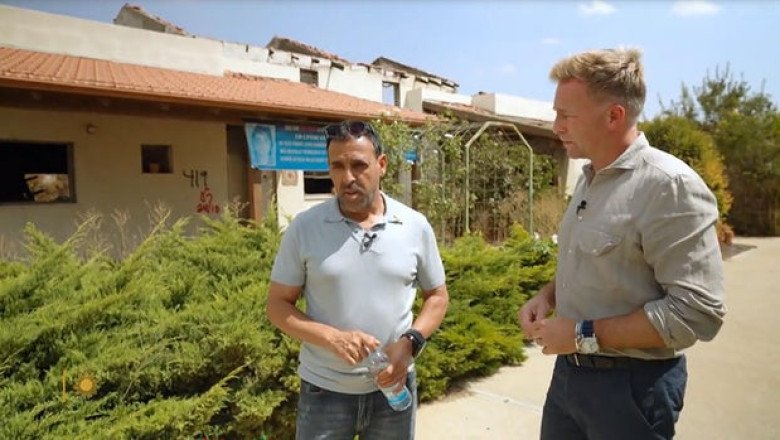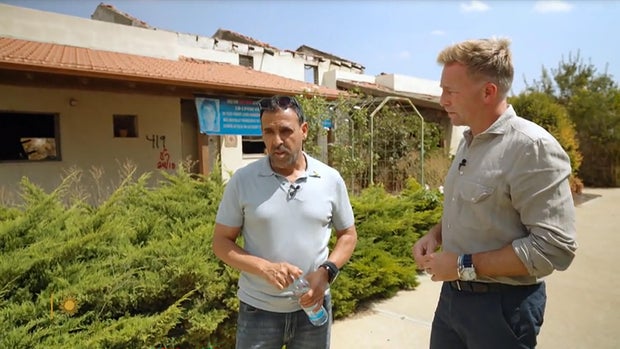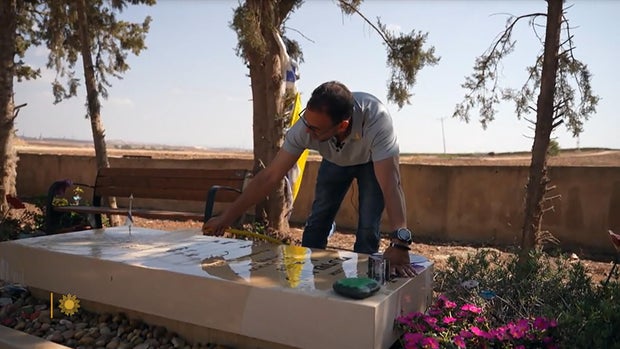
views
“You know, 50 meters underground, you actually understand the meaning in life,” said Eli Sharabi. For 491 days, Sharabi was a Hamas hostage. “That it’s not your academic degrees and not your profession,” he said. “You miss your family and friends, and just wish for another minute with them.”
Held captive deep in tunnels under Gaza, Sharabi always imagined returning to his home in the Israeli Kibbutz Be’eri. “Sunday Morning” was with him earlier this month when he returned for the first time since his release. Time has seemingly stopped in this community just three miles from Gaza. Two years on, the shrubbery has grown up around his house. But there’s no concealing the pain here.
“Wow,” Sharabi said, getting emotional. “I remember they grabbed me from here.”
His wife, Lianne, and their daughters, 16-year-old Noiya and 13-year-old Yahel, were still inside, as Hamas terrorists overran their kibbutz, killing 101 of its residents.
He said, “This place used to help so much to Palestinian civilians – send them money and take some of them from the border to hospitals in Israel.” Those memories are hard to reconcile with his last moments here.
Eli Sharabi returns to Kibbutz Be’eri, with correspondent Seth Doane, for the first time since he was abducted by Hamas terrorists on Oct. 7, 2023. CBS News 
He says he knew he was being kidnapped: “I understood Arabic. My last second in the house, I just turned my head and like that to my daughters and said, ‘I’ll come back.'”
It’s a nightmare he details in his book “Hostage,” a gripping account of his ordeal, in which he wrote on page one, “Five terrorists enter with weapons drawn. We are in our pajamas; they come with uniforms, balaclavas, and Kalashnikovs. They found us.”
“I will never forget the fears in my daughter’s eyes,” he said. “It was horrible.”
In that horrible chaos of the day when 250 others were taken hostage, Sharabi was ultimately brought into a home and tied up.
“After 52 days, they moved us to the tunnels,” he said. “The first mosque we’ve seen, we got in, they opened the door on the floor, and we’ve seen the ladder and they asked us to climb down, something like 30 meters. It looked like the perfect grave.”
In the tunnels under Gaza, Sharabi was held with various hostages, including American Hersh Goldberg-Polin, who was later murdered by Hamas at age 24. Golberg-Polin often repeated a quote which stuck with Sharabi: “He who has a why to live, can bear any how.”
“You’re looking for any source that give you hope, that give you strength,” Sharabi said.
His captors told him his wife and daughters were alive, seen at protests campaigning for his release. It was the “why” he needed to cope with that torture in the tunnels.
“They beat us,” Sharabi said. “One time they broke my ribs and I couldn’t breathe properly for two or three months, and my friend needed to help me to stand to go to the bathroom. They undressed us every two weeks and look for things that maybe we are going to attack them with them.”
What did that experience do to him? “It’s very humiliating moments for you,” he said, “and especially when you are chained to your friends, leg by leg, and you need to go to the bathroom with him … you have to go together. It’s very, very humiliating moment. There’s no running water, so you use bottles. You can see the worms everywhere. Worms, rats, cockroaches.”
When we were in Kibbutz Be’eri in mid-September, explosions could be heard as Israel stepped up its ground offensive in Gaza. “It’s not nice, these explosions,” Sharabi said. “Especially when you think it’s another 48 hostages remain there. Two years. It’s awful for both sides.”
I asked, “There are going to be people who watch this and say, ‘You’re giving this space to this man to share his story. What about the 60,000-plus people in Gaza who’ve been killed?'”
“First of all, they need to remember who started October 7,” Sharabi replied. “If someone can explain to me how you fighting against a terror organization that hiding behind his own population without people to get hurt, innocent people, I don’t know how to do it.”
He worries especially about another captive he left behind: 24-year-old Alon Ohel. Sharabi became a father figure to him in their year-plus together, and when Sharabi found out he was going to be freed, Ohel was not on the list. “You imagine this moment hundreds of times,” Sharabi said. “And you believe it’s going to be the happiest moment ever. And because of Alon, this moment become very complicated. He had small panic attack. He started to cry and shaking. So, we took water, washed his face, hugging him. It wasn’t easy.”
He says his mission now is to bring all of the hostages home. Sharabi has been fighting to get the remaining living hostages out, along with the bodies of those, like his brother, Yossi, who were killed in captivity.
Sharabi’s emotions are often close to the surface, but kept in check, even describing the unimaginable: being shackled. “We were chained with iron chains on our legs, 24/7,” he said. “Every step you make, it’s not more than three inches. It was a week before the release when they took it off, and our legs start to fly all over the place. We couldn’t control them because we didn’t know how to walk.”
When he was released, he’d lost 66 pounds. The handover was terrifying, he says, but he could endure anything just to hug his wife and daughters again. Then, he heard this from the social worker greeting him in Israel: Your mother and your sister waiting for you.
Sharabi said when he heard that he said, “‘Well, just bring me Lianne and my daughters.’ And she said, ‘Well, your mother and your sister will tell you.'”
Lianne, Noiya and Yahel were among the 1,200 people killed on October 7, 2023.
Eli Sharabi tends to the gravesite of his wife, Lianne, and daughters Noiya and Yahel. CBS News 
Next to their graves is a place for his brother, Yossi.
Today, Sharabi said, “I choose life. I need to be strong for them. I don’t have the privilege to break. I’m really grateful for my second chance.”
He says he thinks of his wife and daughters and the life they missed. “But I’m very positive the life I’m going to rebuild,” he said.
I asked, “How can you be so positive after losing so much?”
“I love life. I love life,” he replied. “I’m very proud that I’m that meaningful for other people. It’s the most moving feeling that you can feel, that people care about you. People say for me, ‘We lose simple things, and we think our world is finished. And you lost your brother, your wife, and your daughters, and you’re smiling today. How’s that possible?'”
And his response? “I can’t do anything, anything that bring back Lianne, Noyia, Yahel, Yossi. And so, the best thing I can do for their memories is to be optimistic and to be strong and to rebuild my life.”
For more info:
Story produced by Sari Aviv. Editor: Ed Givnish.
Seth Doane is an award-winning CBS News correspondent based in Rome, Italy since 2016. Doane has covered terrorist attacks and breaking news across Europe, traveled with Pope Francis as part of his coverage of the Vatican, and has reported on issues ranging from migration to climate change.
https://wol.com/freed-hamas-hostage-eli-sharabi-on-rebuilding-his-life-after-491-days-in-captivity/























Comments
0 comment